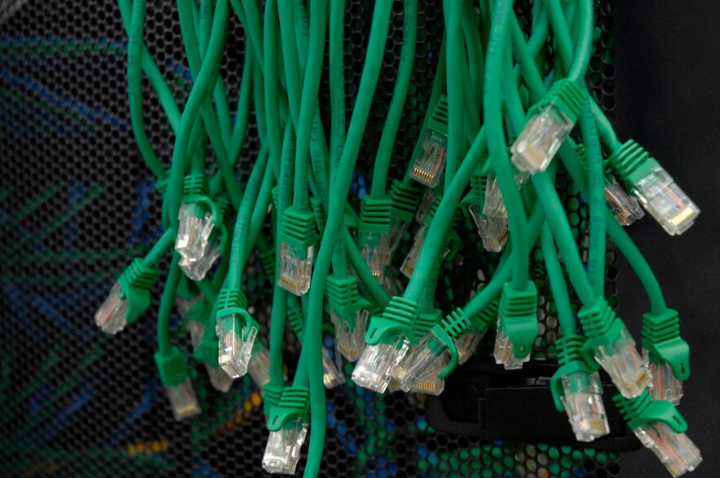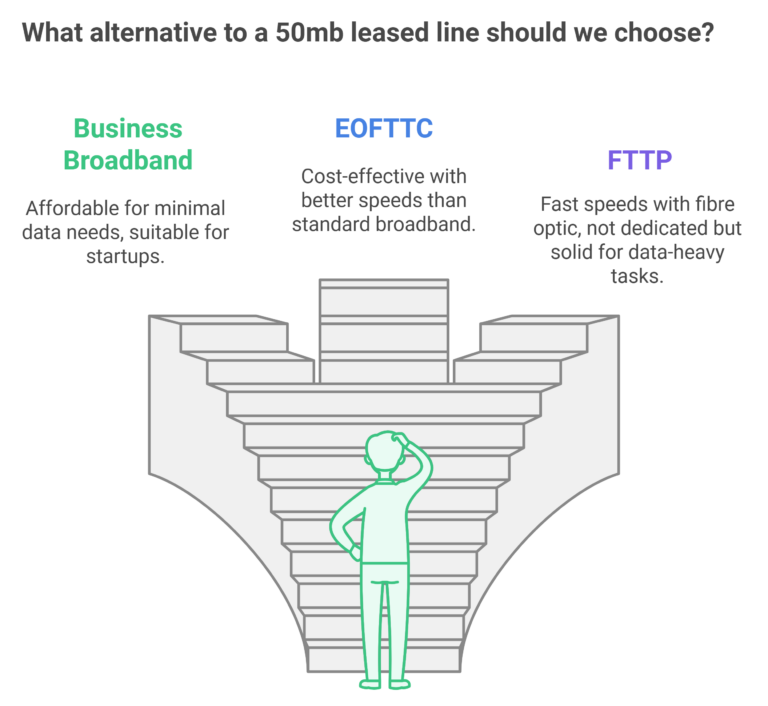We’ve all been there – waiting for files to upload, dealing with lag during video calls or simply losing precious time to slow connections. A 50mb leased line promises to fix that by offering fast, reliable and dedicated internet for businesses.
But is it worth the cost? In this guide, we’ll discuss everything around it that you need to know. Let’s get started.
What is a 50mb leased line?
A 50mb leased line provides a dedicated line of internet to ensure consistent speeds for both uploads and downloads. This type of connection creates a direct link between your premises and the provider’s data centre, bypassing the congestion which is common in shared networks to deliver uninterrupted performance.
It makes your business highly suitable for activities such as video chat, transferring large files, utilising data management software and conducting dummy server tests.
Why choose a 50mb leased line?

A 50mb leased line offers a valid balance of speed and reliability without overpaying for excess capacity. Here’s why it can be a great investment for your business:
1. Consistent speed
A leased line offers equal upload and download speeds. This ensures that data-intensive tasks like cloud access run without interruptions. Unlike shared broadband, your connection is dedicated solely to your business. Biggest pro? No slowdowns during peak hours.
2. Enhanced reliability
Leased lines come with Service Level Agreements (SLAs) which guarantee quick fault restoration and uptime. This reliability ensures your business stays online, even during maintenance or network congestion elsewhere.
3. Scalability for business
Need a solution that grows with your business? A 50mb leased line gives you the flexibility to scale effortlessly as your needs evolve. Whether you’re bringing on new employees or expanding services, you can upgrade to speeds of up to 10GB without overhauling your infrastructure. It’s like having a safety net that keeps pace with your ambitions.
4. Secure and private connection
Leased lines provide a direct connection to the provider’s data centre, offering stronger security than shared broadband. This keeps your sensitive information safe – an essential for industries such as finance and healthcare.
5. Enhanced customer experience
Fast and reliable internet access means quicker responses to customer queries and smoother workflows for employees. Which means what? Enhanced customer satisfaction and employee productivity.
Price of a 50mb leased line
In the UK, the monthly cost of a 50mb leased line is the same as 100mb line because generally, it’s the same line capped at 50MB. This ranges from £185 – £270, depending on the location, type of provider and distance from the Internet Service Provider (ISP).
And then there are installation charges that can range from £10,000 – £20,000 for wired leased lines and £1000 – £2000 for wireless lines.
According to Amvia, there are many providers in the UK who provide £0 installation on a 36-month contract.
Factors affecting the price of a 50mb leased line
Several factors contribute to the leased line prices.
1. Location
The closer your business is to the provider’s data centre, the more likely you are to save on costs. Urban areas usually benefit from lower installation fees because the infrastructure is already in place.
On the other hand, rural locations often face steeper expenses due to extra setup requirements.
2. Contract length
Long-term contracts often come with significant discounts. Many leased line providers offer reduced monthly rates if your business is ready to make a commitment of 2-3 years.
3. SLAs
Not all SLAs are created equal. The best ones come with top-notch customer service, guaranteed uptime and quick fault resolution. Of course, better service often means higher costs – it’s a case of getting what you pay for. Here’s a quick look at the different types of SLAs and the downtime you can expect with each.
4. Additional features
Extra features like advanced security protocols, 24/7 support and equipment rentals can add to the monthly bill. For instance, some providers include routers or maintenance packages in their pricing, while others charge separately.
Questions to ask before installing a 50mb leased line

Installing a 50mb leased line is a significant investment for your business. Before diving in, ask the following questions so you get a solution that fits your needs.
1. What’s included in this service?
Knowing exactly what’s included in your plan can save you from surprise costs down the road. It’s always better to be prepared than caught off guard!
- Does the provider include equipment like routers, installation fees and maintenance charges?
- Are there any hidden charges for upgrades or support?
Always request a detailed breakdown of what’s included in the package.
2. How reliable is the connection?
Does the provider guarantee uptime with an SLA? Because, honestly, if you’re not getting reliable internet access even with leased lines, what good is the idea, right? An SLA ensures that if something goes wrong, it will be resolved promptly.
3. How long will installation take?
Installing a leased line requires groundwork, especially in areas with limited infrastructure. The team will carry out a survey of the area around your business’s premises and then give you a quote for the installation charges and time.
4. Can I scale bandwidth in the future?
Your data needs might grow as your business expands. Ask if you can upgrade to higher upload and download speeds without major changes in the infrastructure.
5. What support options are available?
Reliable customer support ensures issues are resolved quickly. Check if the provider offers 24/7 or 24/5 support and how responsive their team is during outages or queries.
Alternatives to a 50mb leased line
Let’s explore the alternatives.
1. Business broadband
For startups or businesses with minimal data requirements, traditional business broadband remains an affordable choice.
Pro: Low cost and accessible in most locations of the UK.
Con: When compared with leased lines, it has a shared connection, so the performance can be reduced due to congestion, and it lacks the reliability customary of leased lines.
2. EOFTTC
EOFTTC uses copper wiring for the final stretch. This reduces costs but still offers better speeds and reliability compared to standard broadband.
Pro: Cheaper and faster to install than leased lines.
Con: Shared bandwidth means speeds can fluctuate during peak hours.
3. FTTP (Fibre to the Premises)
FTTP delivers fibre optic internet access directly to your premises to offer fast speeds. Compared to leased lines, it’s not dedicated but still delivers solid performance for data-heavy tasks.
Pro: Higher upload and download speeds than EOFTTC and broadband.
Con: Availability can be limited in some areas.

Get a 50MB Leased Line For Your Business With ComparedBusiness
ComparedBusiness can help you link with the top leased line providers in the UK. Just submit your requirements in less than 2 minutes and we will match you with the ones that offer 50mb leased line service. You can pick and choose the best option as per your business requirements. This service comes to you at no cost.
Let’s review the cost range of the 50 mb leased line in the UK. So, you can expect to pay £185 – £270 per month. Prices vary depending on the location, the provider, and the distance from the provider’s data center. Refer to the details above to learn more about the price factors that decide the price. You’ll also need to adjust installation fees, ranging from £1,000 to £20,000.
Yes, a 50 mb leased line is a reasonable option to start with, that also gives you the freedom to upscale in the future. If your data needs exceed in the future you can easily upgrade your 50 mb leased line to 100mb or even 1GB. We recommend to inquire about this possibility from your provider to see what future options are available.
Thanks to Service Level Agreements (SLA), a 50 mb leased line is highly reliable. This agreement is provided by most of the providers in the UK. Similarly, it is also a means to measure the trustworthiness of the provider.
Like any other option, a 50 mb leased line also has its own drawbacks. Oftentimes, the installation costs are high which can be hard for smaller businesses to cover. Also, if your business has minimum data requirements, this option is not cost-effective in the long run.
